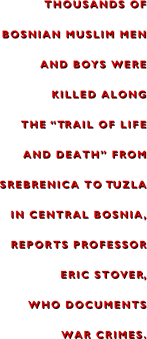

Lectures, seminars, office hours and meetings. Reviewing and grading papers, challenging their students. Carving out time to research, write, catch up on reading. Fund raising and grant writing. Participating on committees.
This is the day-to-day stuff of Berkeley professors' lives.
For the most part, it all happens on 178 acres, on a campus idyllic with eucalyptus groves, redwood stands, grand architecture and views of San Francisco Bay. Their work goes on in university labs, libraries, museums, classrooms -- and at their own familiar desks.
But after the last final exam is graded, this life can change dramatically. Many professors travel off campus to do research, carrying Cal's expertise around the globe. They return to inspire students with real world experience and the latest knowledge from the field.
These scholars live among indigenous peoples deep in the Amazon, search for human bones in the rocky wastes of Ethiopia, study Buddhist art in Mongolian monasteries, help organize exploited lobster divers in the Caribbean, research Calypso music in Trinidad, capture rare frogs in distant jungles.
But there are those professors who depart for places and circumstances more remote and grueling than most of their students, colleagues and even their own families can -- or wish to -- fathom.
The four researchers profiled below not only trek to exotic locales, but also to unsavory, wrenching and sometimes dangerous situations. Voluntarily living amid victims of human injustice, they witness and chronicle violence, suffering and death. Their goal is to shed light on the world's darkest hours.
For more information on each professor, select from the following links:
- Eric Stover, who documents war crimes
- Beatriz Manz, who traces Guatemalan "disappeareds"
- Nancy Scheper-Hughes and Lawrence Cohen, who investigate "neo-cannibalism"


[Table of Contents] [Berkeley Magazine Home] [UC Berkeley Home Page]
Copyright 2000, Regents of the University of California. All rights reserved.
Comments? E-mail ucbwww@pa.urel.berkeley.edu.